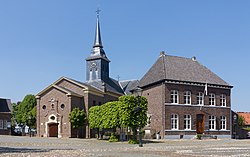Stevensweert
Stevensweert | |
|---|---|
Village | |
 St Stephanus Church and the presbytery | |
| Coordinates: 51°07′50″N 5°50′45″E / 51.13056°N 5.84583°E | |
| Country | Netherlands |
| Province | Limburg |
| Municipality | Maasgouw |
| Area | |
| • Total | 7.39 km2 (2.85 sq mi) |
| Elevation | 26 m (85 ft) |
| Population (2021)[1] | |
| • Total | 1,610 |
| • Density | 220/km2 (560/sq mi) |
| Time zone | UTC+1 (CET) |
| • Summer (DST) | UTC+2 (CEST) |
| Postal code | 6107[1] |
| Dialing code | 0475 |
Stevensweert is a village in the Dutch province of Limburg. It is located in the municipality of Maasgouw. It lies on the right bank of the river Meuse, which forms the border with Kessenich in Belgium. There was also a ferry to this village.[3]
History
[edit]The village was first mentioned in 1221 as in Werde, and means "land near water dedicated to Saint Stephen".[4]
With Ohé en Laak, Stevensweert is situated on an island in the Meuse.[5] The Spanish built a fortress in 1633 during the Eighty Years War,[4] this is still apparent in the street plan of the town. Stevensweert once was part of the Duchy of Guelders. In 1702, it was conquered by the Dutch Republic.[5]
The Catholic St Stephanus is a cruciform church built in 1781 as a replacement of the 13th century church. It was damaged in 1944 and 1945, and restored and enlarged by Pierre Cuypers jr.. The church contains a Roman baptismal font from around 1200. The Dutch Reformed church is a little aisleless church built in 1822. In 1951, the war damage was repaired.[5]
The grist mill Hompesche Molen was built in 1722 as part of the castle complex, and is the only remaining part.[6] The top of the sail measures 37 metres (121 ft) making it the tallest wind mill in the province of Limburg.[7] In October 1944, it was hit several times by British artillery from the liberated Belgian side. The wind mill was restored between 1948 and 1949. In the 1950s, the mill went out of service. Between 1975 and 1977, it was restored and returned to occasional service. The barn next to the mill contains a brasserie.[6]
Stevensweert was home to 600 people in 1840. It was an independent municipality until 1991 when it was merged into Maasbracht. In 2007, it became part of the municipality of Maasgouw.[7]
Gallery
[edit]-
Street view
-
House in Stevensweert
-
Square
-
House in Stevensweert
References
[edit]- ^ a b c "Kerncijfers wijken en buurten 2021". Central Bureau of Statistics. Retrieved 25 April 2022.
- ^ "Postcodetool for 6107AA". Actueel Hoogtebestand Nederland (in Dutch). Het Waterschapshuis. Retrieved 25 April 2022.
- ^ "Kessenich". Agentschap Onroerend Erfgoed (in Dutch). Retrieved 25 April 2022.
- ^ a b "Stevensweert - (geografische naam)". Etymologiebank (in Dutch). Retrieved 25 April 2022.
- ^ a b c Sabine Broekhoven, & Ronald Stenvert (2003). Stevensweert (in Dutch). Zwolle: Waanders. ISBN 90 400 9623 6. Retrieved 25 April 2022.
- ^ a b "Hompesche Molen". Molen database (in Dutch). Retrieved 25 April 2022.
- ^ a b "Stevensweert". Plaatsengids (in Dutch). Retrieved 25 April 2022.







